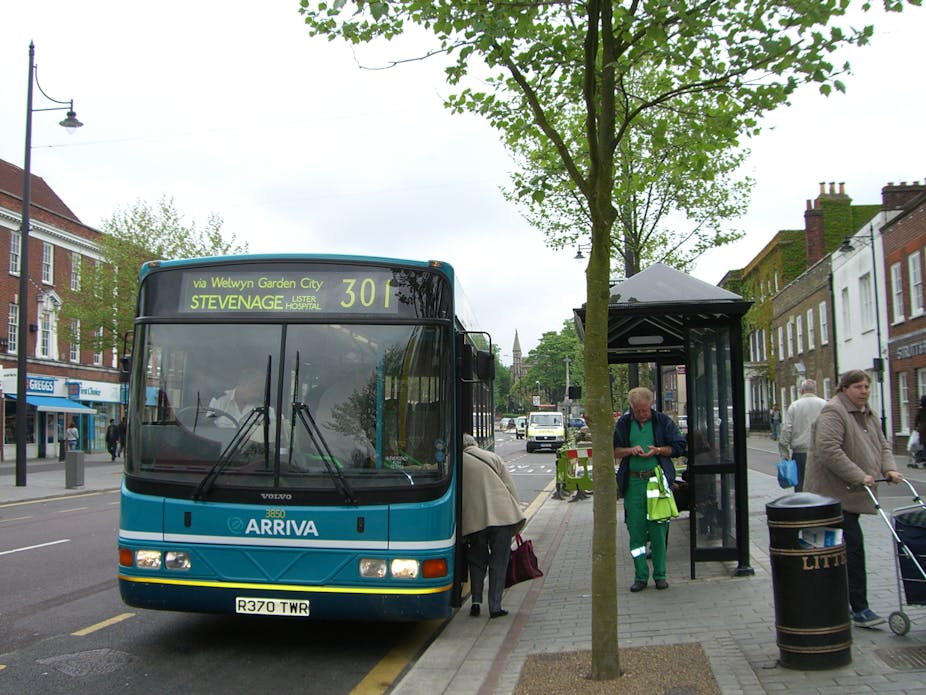Taxpayers in Britain spend more than £1 billion a year providing free bus travel. Mostly used by pensioners, some disabled people qualify for this concessionary travel, and there are fears that an austerity-driven government will cut back on the passes.
Some commentators have suggested there is scope for reducing public spending by cutting the scheme – £1 billion is, after all, a lot of money. Research suggests, however, that free bus passes are good value and worth maintaining.
How the scheme started
Free or reduced bus travel has been offered to older and disabled people in parts of Britain since the 1950s. The proposal for a national minimum standard of half-price local bus travel for people above the state pension age was put forward in John Prescott’s 1998 Transport White Paper, and introduced in 2001. Gordon Brown then extended the scheme in England to free local off-peak bus travel in the 2005 Budget and to travel across the country in the 2006 Budget.
The objectives of introducing the schemes included increasing public transport use by older people, improving their access to basic necessities such as healthcare and shops, reducing their social isolation and social exclusion, and maintaining their well-being.
But achieving social objectives is not the same as being cost-effective. This must be established through a simple cost-benefit analysis: if the value of the benefits exceeds the costs, it can be seen as successful in financial terms. The costs are known – the difficulty is putting a value on the benefits.
Valuing the benefits
The first problem is establishing the effects of introducing concessionary travel for older people. The best way to do this is to carry out a survey of a random sample of the population given concessionary travel passes, compared with a control group who have the same general characteristics but have not been given passes.
The questions would cover all the possible changes that could have occurred as a result of introducing concessionary travel. These could include the amount of travel by buses, cars and walking, the places visited and an assessment of the respondents’ well-being. The differences in the results from the two samples could be interpreted as the effects of the introduction of concessionary travel.
But because the passes are a universal benefit, available to all those around the age of 62 (depending when the holder was born) it would not be possible to find a group in that age group who are not eligible for a pass. About 20% of the eligible population choose not to have a pass, mainly because they have access to a car, but they are not the same as a population who have not been offered a pass but have the same characteristics as those that do.
Significant impact
A review of the evidence found that the passes have had a significant impact. For example, more journeys to the shops spending money, more voluntary work being carried out, a reduction in the number of special transport services required, improved physical and mental health, maintenance of social and economic involvement in society, reduction in social inclusion and improved quality of life.
One recent study suggested that removing free bus passes for disabled people and pensioners would cost the UK economy more than £1.7 billion a year. But many of the benefits of bus passes are extremely difficult – if not impossible – to put a value on.
For example, if the pass allows an older person to get out more and that improves their mental welfare, that is clearly of value. In some cases it could save on the cost of mental healthcare, but it would be difficult to establish how much of the better mental health was due to the bus pass and even harder to put a value on a person’s better mental outlook. Several surveys have found that the pass reduced social isolation, but how can that be valued?
Plus, the evidence suggests that many of the journeys that are made with these passes would have otherwise been made by car – 20% is a rough (and fairly conservative) estimate. This shows that if taken away, the money would not necessarily be put back into the transport system. And this would clearly have an environmental effect too.
Overall, it is impossible to put an exact value on all the benefits of concessionary travel passes, but it seems extremely likely that it would cost well over £1 billion to provide those benefits in other ways. This means that proposals to cut the funding for the scheme in order to reduce public expenditure are likely to lead to a lot of unhappy older people – and, because older people tend to vote, could also have a decisive impact in the general election.
If the pass were abolished, it would probably cost the taxpayer more in the long run. And it would take a brave – or foolish – politician who is prepared to remove a popular benefit from a significant proportion of the electorate.

